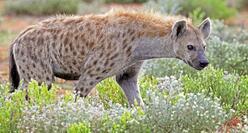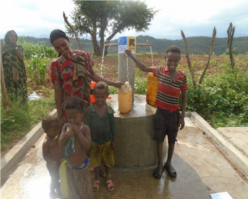Melia stands frozen still. In front of her a hyena stands proudly in the middle of the road. Its fur is speckled with black dots and its ears are pointed upwards, listening attentively to its surroundings. Although its mouth is closed, Melia knows that the hyena’s vicious teeth are lurking beneath.
She starts to pray. She can hear her own breath as the fear takes over her body. Thankfully, the hyena walks away, leaving Melia to continue on her six hour round-trek.

Her destination? A water source.
For nine years, Melia made the same journey to get water.
It started in Gobe village, Ethiopia at 6:00am. She quietly left her home, taking one last look at her sleeping children. The air was crisp and cold and her mouth was dry.
Melia always began the trek walking fast, pacing along the uneven track trying to cover as much ground as possible before the sun rose.
She was hungry and her legs were aching, but she knew that she couldn’t stop, desperate not to leave her children for any longer than was absolutely necessary.
She thought of her children as she walked. It pained her to know that they’d wake up without her and would have to wait hours before she returned home with something to drink and food to eat.
But there was no other option. The drought in Ethiopia was the worst it had been in 10 years, the land had turned sparse and the water sources had gradually dried up leaving the only option many miles away.
For the final part of Melia’s journey, she had to cross the mouth of a river and go into a forest. The trees provided much-needed shade from the sweltering sun.
But the cool of the shade brings new dangers: wild animals. Melia had to stay quiet and keep her eyes tracking the path ahead for any movement through the trees.
Finally, after three hours, Melia would arrive at the water source.
After she filled her container, Melia turned and began the journey home, carrying the weight of the heavy container on her back.

But even after she's faced wild animals, oppressive heat and draining physical exertion – she isn’t safe and neither is her family. The very water that she has worked so hard to get contains bacteria that could leave her children vomiting, with stomach pains and bouts of diarrhoea.
Often, she would be too frail to work on the farm, making it difficult to gather enough food. With little to eat, her youngest child became malnourished.
No one should have to risk their life just to get water. And no one should have to drink water that makes them sick.
It’s why the International Rescue Committee provides hundreds of clean water sources across Ethiopia – including in Melia’s village.
Now Melia’s walk to get water is 10 minutes instead of 6 hours. She can focus her energy on the thing that matters to her most: her family.
The International Rescue Committee provides water and sanitation services in Ethiopia with funding from ECHO EU Humanitarian Aid.
Learn more
Ethiopia, is experiencing its worst drought in decades, leaving more than 10 million people in need of food and aid. Find out more about our vital work.